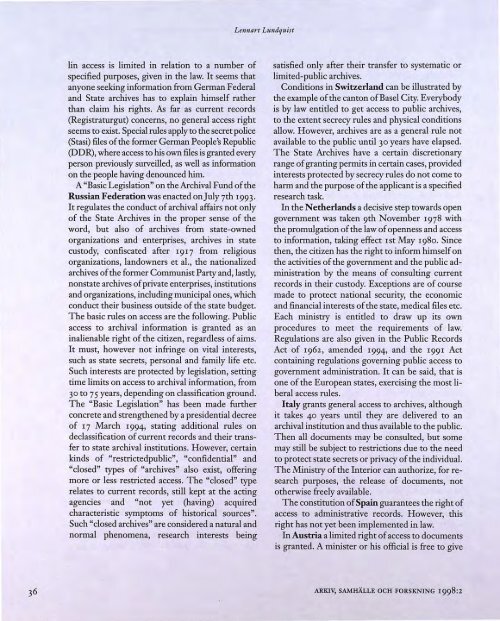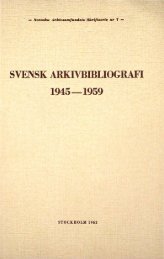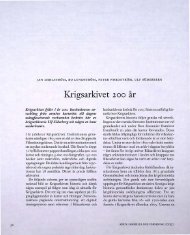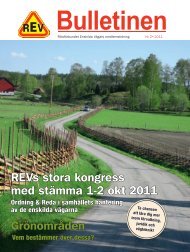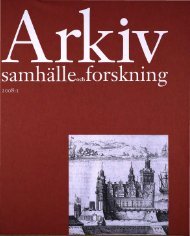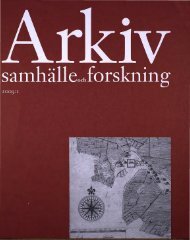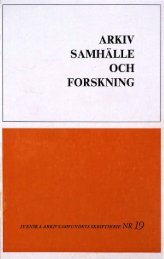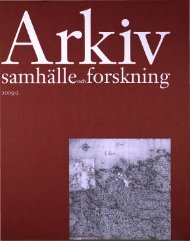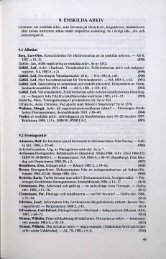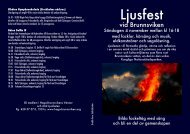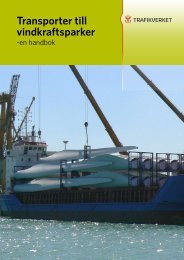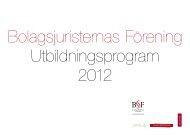Redaktionen har ordet - Visa filer
Redaktionen har ordet - Visa filer
Redaktionen har ordet - Visa filer
Create successful ePaper yourself
Turn your PDF publications into a flip-book with our unique Google optimized e-Paper software.
Lennart Lundquist<br />
lin access is limited in relation to a number of<br />
specifled purposes, given in the law. It seems that<br />
anyone seelång information from German Federal<br />
and State archives has to explain himself rather<br />
than claim his rights. As far as current records<br />
(Registraturgut) concerns, no general access right<br />
seems to exist. Special rules apply to the secret police<br />
(Stasi) files of the former German People's Republic<br />
(D DR), where access to his own files is granted every<br />
person previously surveilled, as weil as information<br />
on the people having denounced him.<br />
A "Basic Legislation" on the Archival F und of the<br />
Russian Federation was enacted onJuly 7th I993·<br />
I t re gulates the conduct of archival affairs not only<br />
of the State Archives in the proper sense of the<br />
word, hut also of archives from state-owned<br />
organizations and enterprises, archives in state<br />
custody, conflscated after I9I7 from religious<br />
organizations, landowners et al., the nationalized<br />
archives of the former Communist Party and, lastly,<br />
nonstate archives of private enterprises, institutions<br />
and organizations, including municipal ones, which<br />
conduct their business outside of the state budget.<br />
The basic rules on access are the following. Public<br />
access to archival information is granted as an<br />
inalienable right of the citizen, regardless of aims.<br />
It must, however not infringe on vital interests,<br />
such as state secrets, personal and family Iife etc.<br />
Such interests are protected by legislation, setting<br />
time limits on access to archival information, from<br />
30 to 7 5 years, depending on classiflcation ground.<br />
The "Basic Legislation" has been made further<br />
concrete and strengthened by a presidential decree<br />
of I 7 March I 994, stating additional rules on<br />
declassiflcation of current records and their transfer<br />
to state archival institutions. However, certain<br />
kinds of "restrictedpublic", "confldential" and<br />
"closed" types of "archives" also exist, offering<br />
more or less restricted access. The "closed" type<br />
relates to current records, still kept at the acting<br />
agencies and "not yet (having) acquired<br />
c<strong>har</strong>acteristic symptoms of historical sources".<br />
Such "closed archives" are considered a natural and<br />
normal phenomena, research interests being<br />
satisfled only after their transfer to systematic or<br />
limited-public archives.<br />
Conditions in Switzerland can be illustrated by<br />
the example of the canton of Basel City. E verybody<br />
is by law entitled to get access to public archives,<br />
to the extent secrecy rules and physical conditions<br />
allow. However, archives are as a general rule not<br />
available to the public until 30 years have elapsed.<br />
The State Archives have a certain discretionary<br />
range of granting permitsin certain cases, provid ed<br />
interests protected by secrecy rules do not come to<br />
<strong>har</strong>m and the purpose of the applicant is a specifled<br />
research task.<br />
In the Netherlands a decisive step towards open<br />
government was taken 9th November I978 with<br />
the promulgation of the law of openness and access<br />
to information, taking effect Ist May I98o. Since<br />
then, the citizen has the right to inform himself on<br />
the activities of the government and the public administration<br />
by the means of consillting current<br />
records in their custody. Exceptions are of course<br />
made to proteet national security, the economic<br />
and financialinterests of the state, medical files etc.<br />
Each ministry is entitled to draw up its own<br />
procedures to meet the requirements of law.<br />
Regulations are also given in the Public Records<br />
Act of I962, amended I994• and the I99I Act<br />
containing regulations governing public access to<br />
government administration. It can be said, that is<br />
one of the European sta tes, exercising the most liberal<br />
access rules.<br />
Italy grants general access to archives, although<br />
it takes 40 years until they are delivered to an<br />
archival institution and thus available to the public.<br />
Then all documents may be consulted, hut some<br />
may still be subject to resttictians due to the need<br />
to proteet state secrets or privacy of the individual.<br />
The Ministry of the Interior can authorize, for research<br />
purposes, the release of documents, not<br />
otherwise freely available.<br />
The constitution ofSpain guarantees the right of<br />
access to administrative records. However, this<br />
right has not yet been implemented in law.<br />
In Austria a limited right of access to documents<br />
is granted. A minister or his official is free to give<br />
ARKIV, SAMHÄLLE OCH FORSKNING I998:2


